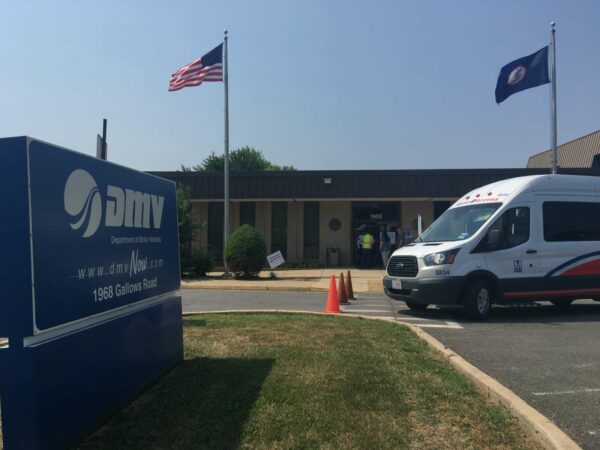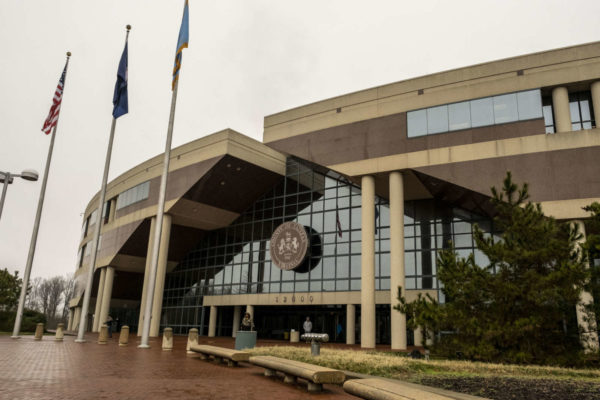
On the heels of last week’s sobering United Nations climate change report, Fairfax County is beginning to implement its first-ever Community-wide Energy and Climate Action Plan (CECAP), which sets goals for reducing greenhouse gas emissions.
Fairfax County staff delivered a final update of the CECAP to the Board of Supervisors during its environmental committee meeting on July 20. The board is expected to accept the report when it meets on Sept. 14.
The CECAP provides an inventory of current greenhouse gas emissions and recommends actions that the county and individuals can take to mitigate future emissions in order to achieve carbon neutrality within three decades.
“A lot of times, people feel like this problem is so big and out of their hands, that they feel like they can’t make a difference,” Fairfax County Office of Environmental and Energy Coordination Senior Community Specialist Maya Dhavale said. “I feel like it’s very timely that Fairfax County has been putting this plan and report together…We’re able to provide residents, business owners, and individuals in Fairfax County a path forward.”
Dhavale, who spearheaded the project, says staff have already begun the process of implementing the plan. That starts with community outreach, public education, and a review of existing county policies to determine how they line up with the proposed plan.
First proposed in 2018 and initiated in early 2020, the CECAP report was developed by a working group composed of environmental advocates, business representatives, civic association members, and other citizens.
As an overarching goal, the work group proposed that Fairfax County become carbon-neutral by 2050 with an 87% reduction in greenhouse gas emissions from 2005 levels.
The Board of Supervisors has already pledged to make county government operations — including building and facility energy use and transportation — carbon neutral by 2040 in conjunction with an updated operational energy strategy adopted on July 13.
The county’s recent push to prioritize environmental initiatives comes as the U.N. continues to sound the alarm on climate change as a crisis that’s already in motion and will only get worse without a substantial shift in human behavior.
In its latest report released on Aug. 9, the Intergovernmental Panel on Climate Change estimates that human activities are directly responsible for a roughly 1 degree Celsius climb in the global surface temperature from 1900 to 2019, contributing to retreating glaciers, rising sea levels, ocean acidification, and increased frequency and intensity of extreme weather events.
Even if future emissions are kept very low, global temperatures will continue going up until at least the mid-21st century and could very likely still be one to 1.8 degrees Celsius higher than 1900 levels by the end of the century, according to the report.
“Stabilizing the climate will require strong, rapid, and sustained reductions in greenhouse gas emissions, and reaching net zero CO2 emissions,” IPCC Working Group I Co-Chair Panmao Zhai said in a news release. “Limiting other greenhouse gases and air pollutants, especially methane, could have benefits both for health and the climate.”
In their report, the CECAP working group says the impact of climate change on Fairfax County is already evident in declining snowfall, more extremely hot days, heavier rainfall, and increased incidences of mosquito and tick-borne illnesses. Read More
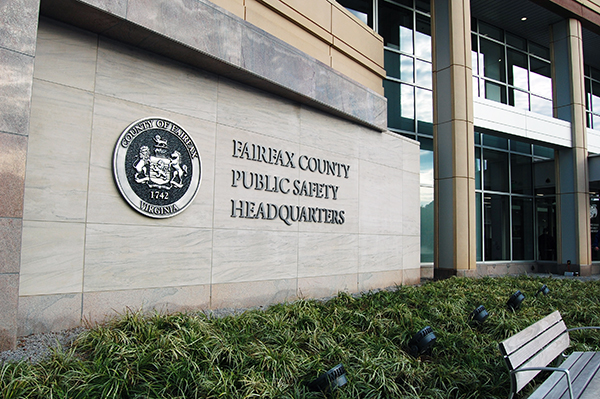
The Fairfax County Police Civilian Review Panel, a citizen-led board intended to help with police accountability, is getting an executive director.
The Fairfax County Board of Supervisors approved the change on July 27 at the urging of the review panel, which is facing increasing caseloads and seeking to gain investigatory powers.
“We’re thrilled that this new position will help us maintain our independence,” Civilian Review Panel Chair Jimmy Bierman said, thanking Board of Supervisors Chairman Jeff McKay and Lee District Supervisor Rodney Lusk, who chairs the board’s public safety committee.
Established in December 2016, the civilian review panel reviews Fairfax County Police Department investigations into civilian complaints with allegations that a police officer abused their authority or engaged in misconduct.
While the panel can make recommendations regarding law enforcement policies and practices, it was not granted the authority to conduct its own investigations.
The review panel, which consists of nine volunteers, documented in February its need for an executive director in an annual report and a four-year review, a document that Bierman spent three months of 40-hour weeks to develop.
The executive director will help the panel document and summarize investigations. Currently, the panel reviews police investigations in person and writes lengthy, time-consuming reports, which means its efforts are heavily dependent on its chair’s schedule.
Bierman, an attorney, likens the change to a congressional committee relying on staff to help draft materials or a federal judge using legal staff to write bench memos.
“It adds to the professionalism of the panel,” he said. “We want to be fiercely independent.”
Since its creation, the review panel has also relied on staff in the office of the independent police auditor, which will now send one position to the panel for the executive director.
Bierman says the staffing switch will help the panel maintain a good working relationship with police by ensuring the independent police auditor’s resources are not overtaxed.
The change to the panel comes after the Virginia General Assembly adopted a law last year that officially permitted localities to create police oversight boards with the power to investigate incidents, make binding disciplinary determinations, and more.
Bierman says the law shows the Commonwealth is serious about supporting independent oversight bodies for police.
The new executive director won’t have independent investigatory powers, but the position could lay the groundwork for the Board of Supervisors to update the panel’s bylaws to give it more authority, as allowed by the new state law, according to Bierman.
The person hired for the new position will be paid $100,000 to $150,000 per year and report directly to the board of supervisors. Springfield District Supervisor Pat Herrity was the only supervisor to oppose the measure.
“I voted against this motion because I didn’t support the original motion to form the Civilian Review Panel as we had an Independent Police Auditor, which is where most significant reviews and recommendations for reforms have come from,” Herrity said in a statement.
On Sept. 28, the board of supervisors’ public safety committee is slated to hear a presentation about the review panel along with recommendations on further reforms in line with the panel’s four-year review. Read More
Fairfax County residents in need of Department of Motor Vehicle services are finding they need to book an appointment months in advance.
In response to those reported concerns, the county Board of Supervisors agreed on Tuesday (July 27) to contact the state to see how it will address wait times.
Springfield District Supervisor Pat Herrity said residents have reported that they’re traveling as far as three hours away to South Hill to get DMV services.
“Given that DMV services are essential, Fairfax County residents should not have to wait over a month or be forced to go to other parts of Virginia for an appointment,” Herrity said.
The DMV introduced the appointment system when it reopened sites in May 2020 after a pandemic-induced shutdown. During that time frame, it has also added more online capabilities to help reduce foot traffic.
“We are not yet where we need to be, but we are proud of the progress we’ve made from implementing a brand new appointment system in the height of a global pandemic a little more than a year ago,” DMV spokeswoman Jessica Cowardin said in a statement.
On a recent visit to a DMV center in Tysons, Great Falls resident Barbara Martin found the experience quite different compared to when walk-ins were allowed, which would result in dozens of people crowding into the building.
Martin booked her appointment about a month and a half ago and said she was relieved to be there, expressing appreciation for the staff’s attention to details.
The DMV reopened its Tysons location (1968 Gallows Road) in June 2020 and its Sterling location (100 Free Court) in August 2020. It also opened a new customer service center in Sterling (22360 S. Sterling Blvd., Unit D112) this past January.
“By installing an appointment system we have become more efficient, transactions are conducted quickly and customer wait times have been minimized,” Cowardin wrote. “And appointment availability will continue to increase as we are able to hire and train employees and emerge more fully from the pandemic, which is still ongoing.”
Chai Chala of McLean says he lucked out and only had to wait 10 days for an appointment at the Tysons DMV center, which he visited to register a new car.
“The experience was really nice,” he said, adding his only complaint was the sun’s heat.
Since reopening, the DMV added several services to its website that can save customers a trip to a physical building.
In September, it introduced two-year renewals for driver’s licenses and ID cars by online and mail, and in November, it began online renewals for commercial driver’s licenses. As of February, it also now offers drivers the ability to replace licenses and permits that were lost or stolen.
Customers can also get appointments with DMV Select partner officers, which conduct vehicle-related transactions, as well as DMV Connect, a team of mobile workers whose regular stops include the Fairfax County Government Center.
Cowardin said the DMV intends to keep the appointment system for the foreseeable future, noting that the vast majority of transactions conducted since May 2020 have been conducted remotely.
“During the pandemic, customers shifted the way they conduct business with DMV in that more customers are now conducting DMV business by service delivery methods other than the [customer service centers], such as mail, internet, online dealers or DMV Select partners,” she noted.
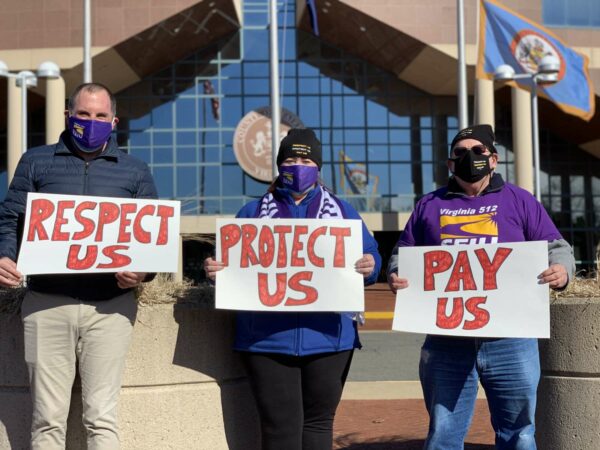
One in seven Fairfax County employees can’t afford an adequate standard of living in the county where they work, a report released last week by a Richmond-based think tank found.
Published on July 21 by The Commonwealth Institute for Fiscal Analysis (TCI), which advocates for public policy that advances racial and economic justice in Virginia, the “Rebuilding Stronger for Fairfax County” report comes as county leaders continue discussions on a collective bargaining ordinance for public employees.
Comparing government workers’ salaries to the cost of living and what their private-sector counterparts earn, the study authors say their findings support the need for collective bargaining, where employee unions can negotiate compensation, working conditions, and other terms of their employment.
“The fair and clear standards provided by unionization particularly help Black and Latinx workers,” TCI Research Director Laura Goren said in a statement. “Women, who make up the majority of local government workers, would also particularly benefit from collective bargaining.”
Using the Economic Policy Institute’s family budget calculator, TCI determined that a single person would need an annual income of at least $57,052 to afford a “modest yet adequate” standard of living in Fairfax County, including housing, transportation, health care, taxes, and other necessary expenses.
A family with one parent and two children would need to earn at least $106,395 a year.
According to the report, however, the bottom 20% of Fairfax County’s workforce in terms of salary, including part-time employees, make between $40,000 and $60,000 annually, leaving them unable to support themselves.
Only the top 20% of workers, who earn under $120,000, can cover the cost of living for a family of three.
The findings came after TCI released a similar report on Loudoun County, where one in five county workers can’t afford an adequate standard of living. The Board of Supervisors there voted on July 20 to proceed with crafting a collective bargaining ordinance.
According to TCI, public employees in Virginia are typically paid 29.9% less than what they would get in the private sector, a gap that widens to 33.4% in Northern Virginia. When pension and health care benefits are considered, the difference in compensation narrows slightly to 28% for the Commonwealth as a whole.
As the cost of living has risen, so have turnovers and vacancies, which went from 3.4% of all Fairfax County government positions in fiscal year 2007 to 8% of all positions in FY 2016, according to a county “lines of business” review of employee compensation.
While it won’t close the gap between public and private wages, the TCI report says giving public workers the ability to collectively bargain would help address inequities, boosting pay by 5 to 8%.
“This report provides rigorous research that backs up what essential workers have always known to be true,” Tammie Wondong, president of SEIU Virginia 512’s Fairfax County chapter, said. “Having a seat at the table through collective bargaining allows us to advance equity and build an even stronger community where every working family can thrive.”
SEIU’s Fairfax County Government Employees Union Chapter, which represents more than 2,000 workers, has been advocating for a collective bargaining ordinance since the Virginia General Assembly passed legislation giving localities that authority in 2020, though the law didn’t take effect until May 1 of this year.
County staff released an initial draft ordinance on May 25, and the Fairfax County Board of Supervisors has been debating the scope and details of the proposal for the past two months. The most recent draft came before the board’s personnel committee on July 20.
Board of Supervisors Chairman Jeff McKay echoed Wondong’s sentiments, saying the TCI report confirms that collective bargaining will reduce inequity, support quality jobs, and improve county services.
“I’m proud of the steps we’ve taken to ensure a great county workforce, including a $15 living wage, paid family leave, initiatives to increase workforce housing, and a strong retirement system,” McKay said. “Collective bargaining will further help us attract and retain great employees to ensure we continue delivering quality public services for our community.”
Fairfax County Human Resources Director Cathy Spage said at last week’s committee meeting that when the board meets on Sept. 14, county staff will ask it to authorize a public hearing on the proposed collective bargaining ordinance on Oct. 5.
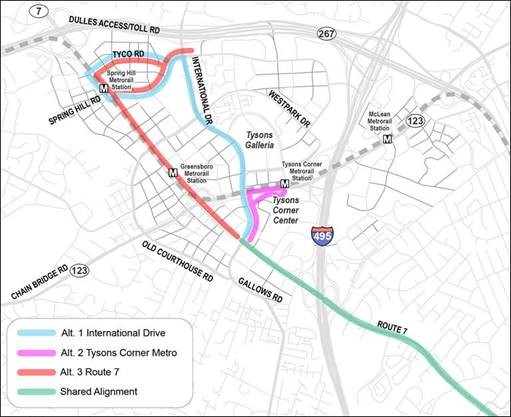
The Fairfax County Board of Supervisors has approved a bus rapid transit (BRT) route through the heart of Tysons, despite some concerns that it might not be as “express” as hoped.
Fairfax County started studying options for BRT through Tysons three years ago as part of a regional push to establish a bus line between Tysons and the Mark Center in Alexandria.
After reviewing several alternative routes, the board voted on Tuesday (July 27) to approve county staff’s recommendation for a route that will run from the Spring Hill Metro station up to International Drive and from there down to Route 7 past Tysons Galleria and Tysons Corner Center.
“The outreach on this plan was very well done, very thoughtful, and working with our transit associations,” Providence District Supervisor Dalia Palchik said. “I think this has had robust input from our community…This is going to be best for businesses in Tysons and for our pedestrians and cyclists.”
One concern raised at the board meeting by Springfield District Supervisor Pat Herrity is that the route won’t have pull-off spots that will allow for both express buses that run directly between major points without interruption and local buses that would make more frequent stops within Tysons.
“I think we’re really short changing ourselves not doing the local stops, where they pull off, so we can run express [buses] on it,” Herrity said. “I think long term, we’re going to be sorry for that.”
Herrity abstained from the final vote, saying he supported the project overall but had concerns about its structure.
Chairman Jeff McKay said the existing configuration represented a compromise between the need for better transit and respecting the right-of-way limitations in Tysons.
“Right of way is at a premium,” McKay said. “The impact to our businesses and impacts to our residents on the right-of-way needs of these projects is significant and significantly challenging.”
With the route approved, the Tysons BRT route will be incorporated into the Northern Virginia Transportation Commission’s broader Envision Route 7 study, which is currently in its fourth and final phase.
Plastic Bag Tax Public Hearing Scheduled — The Fairfax County Board of Supervisors authorized a public hearing for 4:30 p.m. on Sept. 14 to gather community input on a proposed five-cent tax on disposable plastic bags. If the ordinance is approved, Fairfax County would be the second locality in Virginia to adopt a bag tax. [Fairfax County Government]
Tysons Partnership Funding Approved — The Board of Supervisors approved $250,000 in Economic Opportunity Reserve funds for the Tysons Partnership, which will use the money to support branding efforts, install a mural on the former Container Store property, and position itself for long-term financial health. The board nominated the organization for up to $1 million in EOR funds in December. [Sun Gazette]
McLean Area Is a Hotspot for Rich Politicians — Virginia’s gubernatorial candidates both call Fairfax County’s most affluent zip codes home, with Democratic nominee Terry McAuliffe living in a $1.1 million McLean mansion and Republican Glenn Youngkin boasting a $1.7 million estate in Great Falls. More notably, former Speaker of the House Newt Gingrich says he moved to McLean because he and his wife saw “an alcoholic” sleeping on the ground in Old Town Alexandria. [The Washington Post]
Vienna Restaurants Up for RAMMYs — The Restaurant Association Metropolitan Washington tweaked its 2021 RAMMY awards to recognize how the industry adapted to the COVID-19 pandemic. Finalists include Clarity (Outstanding Covid-Safe Redesign), Caboose Brewing Company (Prime Pandemic Patio Scene), and Taco Bamba (Standout Family Meal Packages To-Go). The latter two categories will be open for a public vote from Aug. 2 to Sept. 2. [Patch]
(Updated at 11:30 a.m.) Fairfax County could require all of its employees to get vaccinated against COVID-19 when they return to offices this fall.
During their meeting today (Tuesday), the Fairfax County Board of Supervisors unanimously approved a motion brought by Chairman Jeff McKay directing County Executive Bryan Hill to evaluate whether to implement a vaccine mandate for the county’s 12,000 government employees, who range from library staff to police and solid waste workers.
While the county has reported relatively high vaccination rates, with almost 80% of adults having gotten at least one dose, some people who are eligible for the vaccine are choosing not to get it because of “false information,” according to McKay.
“Getting vaccinated is an act of public charity,” McKay said. “It’s not just about protecting you, but protecting everyone that you work with, every county resident that seeks our services, and everyone that works in our community.”
McKay confirmed that Hill is currently developing a plan for county government employees to return to offices in September.
The board directed Hill to consider providing some exemptions from the vaccine mandate for “religious and medical purposes” as well as requiring face masks and weekly COVID-19 testing for employees who do not qualify for an exemption and continue to refuse to get vaccinated.
In introducing the motion, McKay cited the growing prevalence of the delta variant, which now makes up more than 80% of all new cases in the U.S. and an estimated 69.4% of cases in the mid-Atlantic region, including Virginia, according to the Centers for Disease Control and Prevention.
Like elsewhere in the country, Fairfax County has seen a rise in cases throughout July.
McKay noted that the need to bring COVID-19 case levels back down is especially urgent as Fairfax County Public Schools hopes to reintroduce five days of in-person learning when the new school year starts in August.
“What is happening right now with the delta variant in our community is scary for so many people, and I know it’s scary for our public school system,” McKay said. “Keep in mind that there are thousands of kids in elementary school that don’t have the luxury of getting vaccinated, and we need to do it for them. We need to make sure that our schools can reopen fully and safely, and we all need to get vaccinated to ensure that that happens.”
The board’s move comes as the CDC is expected to announce this afternoon a reversal of its policy allowing unvaccinated people to go maskless indoors, as reported by The Washington Post and other national outlets.
David Taube contributed to this report.
Pedestrian Killed in McLean Crash — “Crash Reconstruction detectives are responding to Chain Bridge Road and International Drive in McLean to investigate a fatal crash where an adult male pedestrian was hit by a car. The driver remained at the scene.” [FCPD/Twitter]
Man Arrested for Falls Church Stabbing — According to Fairfax County police, a man was taken to a hospital with non-life-threatening injuries after being stabbed during an assault by four men in the 3000 block of Graham Road on July 19. A Maryland man who attempted to run when officers arrived on the scene has been arrested and charged with assault by mob. [FCPD]
FCPS Student Data Breach Reported — Fairfax County Public Schools released confidential student information, including email addresses and identification numbers, as part of a Family Educational Rights and Privacy Act records request. An FCPS spokesperson says the school system is “in the process of tightening its processes and increasing training opportunities in the handling of data to ensure this cannot happen again.” [Fairfax County Times]
Traffic Calming Changes Coming to McLean — The Fairfax County Board of Supervisors is scheduled to approve a series of traffic calming measures in the McLean area when it meets tomorrow (Tuesday). With a total cost of $65,000, the changes include the installation of speed humps, removal of a speed table, and placement of edge-line striping on Kimberwicke Road. [Sun Gazette]
Registration Opens for McLean 5K — The McLean 5K Run will back in person on Oct. 2 for its 13th year, and online registration is now open through 8 p.m. on Sept. 30. The annual event is hosted by the McLean Community Center and will benefit the McLean Community Foundation. [Supervisor John Foust/Twitter]

The Countywide Strategic Plan meant to establish a community-driven vision for Fairfax County for the next 10 to 20 years is edging closer to an expected adoption by the Fairfax County Board of Supervisors.
The county hosted a community update and feedback session on Wednesday (July 21) to gather feedback about potential indicators for success among nine priority areas listed in the proposed 56-page strategic plan.
It was part of the fourth phase of engagement initiated by the county. Two rounds were held in 2019 before the process was paused in 2020 to evaluate COVID-19 impacts. Two additional phases were added for 2021, with the third survey phase wrapping up in April.
The Board of Supervisors is expected to take action in October, according to countywide strategic plan coordinator Aimee Brobst, who led the meeting.
While there are no outreach plans to solicit direct public comments on the final text before it is presented to the board, Brobst said community engagement will continue after the plan is adopted. At that point, the county’s approach will “likely shift” to a more targeted focus on each priority area in addition to seeking feedback on the plan as a whole.
“We definitely want to use the feedback that we’re collecting here for the purpose of informing the strategic plan,” Brobst said. “But as we look forward, beyond even when the plan is adopted by the Board of Supervisors, we want to make sure that this isn’t something that stops once the plan is adopted, and we are being very thoughtful and very intentional about hearing from as many people as possible as we move forward.”
The nine priority areas of the plan include:
- Cultural and recreational opportunities
- Economic opportunity
- Effective and efficient government
- Empowerment and support for residents facing vulnerability
- Health and environment
- Housing and neighborhood livability
- Lifelong education and learning
- Mobility and transportation
- Safety and security
A poll to gauge attendees’ preferred focus areas within those categories found particular interest in access to cultural and recreational opportunities; economic stability and mobility for all people; financial sustainability and trustworthiness; and access and utilization of services.
Other top indicators were air, water and land quality; housing affordability and quality; career-based training and early childhood education; accessibility, affordability and equity for mobility and transportation; and reliability and security of critical infrastructure.
County staff noted that the plan is meant to be flexible with the ability to adapt over time, serving as a template to help the board determine its priorities and understand what community members think is important.
Acknowledging the rather sparse attendance at the meeting, Brobst said that the shift to virtual meetings over the past year due to the COVID-19 pandemic has pushed the county to rethink and expand the tools it uses to engage the public.
“In addition to everything we’re doing that we think makes sense — using every channel that we have available to us as the county — we are very open to adapting,” Brobst said. “…One of the things we definitely wanted to do as part of this process is not necessarily do things just the same way as they’ve always been done in terms of doing only in-person meetings or doing just surveys or long-form surveys.”
A form for general questions or feedback for the plan is available at the bottom of the strategic plan page on the county’s website.
America won’t celebrate its 250th birthday until 2026, but Fairfax County has decided it’s not too early to start planning the party.
At the Fairfax County Board of Supervisors meeting on Tuesday (July 13), Gunston Hall Executive Director Scott Stroh presented a report on behalf of a seven-person work group with recommendations for how the county could observe the U.S.’s semiquincentennial anniversary.
Recommendations touched on thematic, organizational, and practical considerations, among them adopting the word “commemoration” to describe the anniversary, making sure it reflects the “fullest American story,” and issuing a countywide survey of residents about what they want out of the occasion.
Additionally, the work group recommends having an organizational structure, a marketing and promotional plan, and a preliminary multi-year budget set by the end of the year.
“This commemoration offers an important and compelling opportunity to celebrate our accomplishments and progress as a nation and community, but also opportunities to foster cooperation, facilitate conversation, and inspire actions so that all can equally enjoy the benefits of life, liberty, and the pursuit of happiness,” Stroh said. “Fairfax County is distinctly positioned to lead this effort in Virginia.”
July 4, 2026 will represent 250 years of American independence from Britain, which is generally marked from the full adoption of the Declaration of Independence and formal start of the Revolutionary War. Both nationally and in Virginia, committees, organizations, and work groups are taking shape to start preparations for the anniversary.
Fairfax County is the only municipality in the Commonwealth to have initiated this effort to date, according to materials provided to the board.
“I’m glad we are leading by example,” Board of Supervisors Chairman Jeff McKay said.
The board established Fairfax County’s work group in October 2020. It includes representatives from Visit Fairfax, George Washington’s Mount Vernon, the Fairfax County History Commission, and the City of Fairfax Regional Library.
Going forward, the work group suggested that it could become a “more formal planning entity,” one with a larger membership that’s more diverse and more representative of the county as a whole.
Stroh anticipates the planning and the commemoration itself will be paid for through a variety of methods, including county funds, grants, state money, and private support.
In general, the board seemed pleased with the report, but it didn’t take any action beyond accepting the report. Instead, a board matter outlining possible next steps will be proposed when the board next meets on July 27, McKay said.
McKay emphasized that the commemoration should be inclusive and tell a “fuller American story.”
“I think many of us have heard of this notion of erasing history or redoing history,” McKay said. “In fact, [it is] quite the opposite. We are trying to bring to light the entire history and how we do better in the future.”
Lee District Supervisor Rodney Lusk made similar comments, saying his daughter recently remarked on many of America’s founders being slaveholders.
“That is a contradiction. That is a flaw,” he said, while reading off a portion of the report that positions commemoration as a chance to assess how the country is still striving to match its ideals with its actions.
“[This commemoration] is more than a chance, it’s an opportunity to actually do this,” Lusk said.


